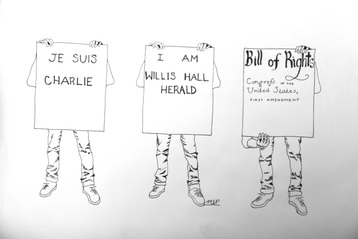 Freedom of the press and speech are not optional in the United States of America. The First Amendment does not state that those liberties are afforded as long as no one is offended or disagrees. Similarly in France, the site of terror attacks against the staff members of the satirical magazine Charlie Hebdo, the law on the freedom of the press guarantees these individual rights. While French law provides some amount of defense for libel, the magazine was well within its legal rights to publish cartoons criticizing religion. If the terrorists thought that they had grounds for libel charges against Charlie Hebdo, they could have, through the unique French legal system, taken the magazine to court and made them prove their statements. If proven guilty, Charlie would have incurred either fiscal penalties or been forced to make public apologies. The morality of deciding to publish cartoons that deliberately offend large groups of people is questionable, as some would argue that whatever entertainment value they provide is heavily outweighed by the outrage they produce. While this is a legitimate concern, it would have much more weight if the cartoons had only attacked one religion, thus providing a basis for libel charges. However, Charlie does not pull any punches, mocking Christianity and Judaism along with Islam. By not showing bias against one particular religion, Charlie merely put up a mirror to show, admittedly from a far-left perspective, the flaws in each religion as they see it. A magazine like Charlie Hebdo typically thrives from dissent, as they are similar to Justin Bieber and Alex Rodriguez in that people love to hate them, but a group of terrorists decided that 12 people deserved to lose their lives over a series of cartoons. The irony remains that the terrorists’ efforts may have backfired, as they have shifted the global spotlight onto Charlie and necessitated the colossal uptick in production of the Charlie Hebdo magazines from the normal 60,000 to over seven million copies of the first issue since the attack. That means Charlie made more than 21 million Euros (roughly $25 million) in the last two weeks. While the Charlie Hebdo massacre and the events surrounding it in Paris are indeed tragic, it is important to put this attack into context. The perpetrators were all French citizens who were radicalized at home; this corresponds with a disturbing trend in Europe of Muslim and immigrant communities becoming religiously radicalized by a lack of socio-economic integration into their adopted countries. Muslims and immigrants across Europe continue to face endemic poverty and discrimination by native Europeans; however, the American press under-reports these aspects of European society, ignoring a crucial aspect of the Charlie Hebdo attack. Many countries in Western Europe, including France, the United Kingdom, and Germany, who have recently opened themselves to immigration from areas such as the Middle East, parts of Africa, and South Asia, have experienced major bouts of xenophobia and racism from segments of their native populations. On the same week of the Charlie Hebdo massacre, the German anti-Islamic, anti-immigrant protest group PEGIDA staged large demonstrations across Germany, demanding the expulsion of immigrants and a return to traditional, “untainted” Judeo-Christian values. However, these events garnered little attention in the press compared to the massacre in France that occurred simultaneously, even though this continued hostility towards “non-native” cultures in Europe is perhaps the most direct cause of Islamic and anti-Western terrorism seen in Europe today. These types of attacks, however, committed by alienated Muslims or foreigners, are a smaller threat to the United States than they are to Europe. As a historical nation of immigrants, American society accepts foreign cultures and peoples relatively easily into its midst, and, although exceptions exist, American Muslims are far better integrated into our culture than they are in Europe. It is also important to remember that the Charlie Hebdo massacre, although brutal and inhumane, is an extremely small event compared to the many acts of terrorism that occur across the world on a daily basis. In Nigeria, for example, the sadistic insurgent group Boko Haram massacred over 150 people in a raid on the town of Baga, also on the same week of the Charlie Hebdo massacre, however this incident and countless others have also been under-reported and forgotten by the international community. Dozens die in war-torn nations such as Syria and the Central African Republic every day, and yet these conflicts and deaths rarely make headlines. Even a terrorist attack on a school in Pakistan, which killed a shocking 141 children, received far less attention than the Paris attack, even though the death toll was eight times as high. The lack of reporting, coverage, and general awareness of these events indicates a dangerously Eurocentric perspective from the media. Not only is the subject of the freedom of press significant around the world, but also in our tight-knit community. At the beginning of January, the Willis Hall Herald’s third issue was pulled from campus. The controversy over publishing an article covering a sensitive topic caused the issue to be withdrawn. However, according to the theory of freedom of press, the staff had every right to address the topic, and it would have been un-journalistic to have swept the matter under the rug. One of the primary reasons for its removal was Visitors’ Day. While from an administrative point of view, the publications may have persuaded visitors to look elsewhere for their child’s education, do such issues not happen elsewhere? Every high school has honor issues. These issues need to be addressed in order to teach others of the consequences. It is important to admit to one’s wrongdoings, and to learn and move on from mistakes. Charlie Hebdo published many controversial cartoons that eventually led to the massacre of the editorial staff. Such extreme responses are not expected from readers, and there are other ways to address publications that are viewed as offensive. For instance, letters to the editor is way in which one can express one’s feelings without causing harm. In such case, the staff can review the response, and discuss whether they should publish such controversial topics just because they have the right. However, the staff has to keep in mind that an editorial should not create indifferent responses. Not everyone can be pleased by one opinion on a controversial issue. Therefore, even though the third issue was withdrawn due to negative views, the staff will continue to produce editorials that can produce different emotional responses, just like Charlie Hebdo published an issue of cartoons following the massacre. Sometimes there are few incidents that happen in the community, and sometimes there are extreme occurrences. This includes all that is positive and negative. However, no matter the case, the community has every right to know what is happening, and a journalism staff has an obligation to inform them. While we will not go as far as to attack someone’s religion, we will not be kept quiet on big matters concerning our community.
0 Comments
Editorial: It is imperative that we be honorable We're all born with honor, but that honor can easily be lost.
When someone lies, cheats or steals, they cast off a sense of honor. Once gone, it is incredibly hard and nearly impossible to earn back. The physics students who were incriminated with violating an honor offense, mainly cheating, lost their aura of honor. They can no longer serve on the SCA, Honor Council or accept Cum Laude honors for this reason. Although they are still the same people, one cannot look at them the same when concerning loyalty. The faculty and principals of this school have granted the students a great privilege concerning iPads. In a sense, it is like a parent letting their child use the family car to drive to and from a high school party. That parent has put faith into their children assuming that a sense of maturity has been reached. If that child misuses his newly found independence by driving more than one non-family member, driving intoxicated, driving over the speed limit, texting while driving or allowing passengers to distract them as they drive, accidents can occur. How long does it take for that parent to trust their child again and what punishment is sufficient enough to teach them a lesson? When the students were brought before the Honor Council individually, each was punished with the standard punishments for first offenders: a letter of apology (in this case two letters) and a Saturday detention. If teachers are like the parents to these students, how can they continue to trust them after they misused their right to use iPads in an appropriate way? While it was confirmed that honor violations occurred, the question haunts all those involved in the cases—who is to blame? Is it the student violators themselves? Or is it the technology that encouraged such a travesty? If we're all born with honor then the students were the direct perpetrators of the cheating. Then it does not matter whether or not they used an iPad or sheet of paper; they still cheated on their own accord. It was their decision, and their decision alone. However, it may have been more accessible to cheat with an iPad. While the headmaster thrives on the idea of the Willis Hall eventually becoming iPad use only, instead of traditional textbooks, can he trust his students with this independence? After all, the Internet is a temptation. With a test open on Safari, it is easy to open a new tab and search the Internet for help. Even though all honor is lost once exiting the test, students seem to think it more of a border line violation. But one cannot assume that they have not been taught that this is an act of sin. The Honor Council has made multiple presentations and advisory discussions on what is honorable and what is not. Unfortunately, there is not a simple solution. Cheating, lying and stealing have always occurred and will continue to occur, but perhaps we can reduce the cases and try to ingrain the importance of honor into the student body. When students are taking an exam on their iPads in a classroom, it should not be propped up, but flat on the desk. In this case, if a student looked at another’s test, it would be just like looking on a paper copy. The teacher or proctor should also walk around the room to supervise the testing. Then maybe it might not be so easy to open up a second tab. This is not to say that the cheating scandal is the faculty’s fault. Honor cannot always be regained, but we have to try. If we just give up, then what will become of us? There is one obvious solution to end cheating in this particular case; dispose of the iPads as a testing tool. While this is an unrealistic goal, it is one to consider. However, no matter what the school decides to do, whether it is continuing to give us independence or stripping us of it, we have to remember what the lesson is from these honor cases. Even though honor is something you are born with, that doesn't necessarily mean it’s always with you. You have to maintain that loyalty, and not let it disappear. If misfortune falls our way, we must work twice as hard to earn back that trust, and if we cannot win back our losses, then at least we know how hard we've tried to correct our mistakes. If readers stopped reading the Herald for every mistake we make, we would have to stop printing our issues. Everyone big and small makes mistakes, and it is important to learn from the past so we don't make them in the future. |
Editors:Editor-in-Chief: Archives
May 2024
Categories |


 RSS Feed
RSS Feed